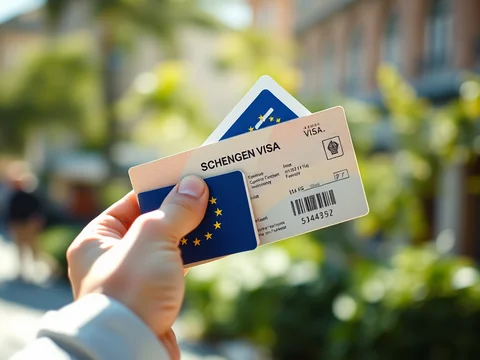How to Apply for a Schengen Visa: Tips for a Smooth Application Process

The European Schengen Area is a space encompassing 29 countries. If you're planning on visiting Europe anytime soon, you will need a Schengen Visa to enter any of these countries.
Applying for a Schengen Visa can be a complicated process, but immigration lawyers will simplify each step for keen adventurers, from deciding on the type of Schengen Visa to appealing a rejected application.
Overview of the Schengen Visa
The Schengen Visa grants access to the Schengen area "” consisting of 29 European countries "” to non-EU nationals. Travel is permitted for up to 90 days in any 180-day period.
There are three types of Schengen Visa:
- Single-Entry Visa (for one entry to the Schengen area)
- Multiple-Entry Visa (several visits to the Schengen area)
- Airport Transit Visa (stopovers and flight changes within the Schengen area)
Who Needs a Schengen Visa?
People travelling to the Schengen area from certain non-EU countries require a Schengen Visa. This includes citizens of:
- Turkey
- South Africa
- Cuba
- Egypt
- Vietnam
- Jamaica
- Bolivia
- Iran
How to Apply for a Schengen Visa
Applicants must go to the consulate of the European country they wish to visit and apply for a Schengen Visa. If multiple countries are involved, apply to the country where you will spend the most time, or the first country you will visit.
Documents
Certain documents are required as part of the application process, including:
- Visa application form
- Medical insurance
- Valid passport
- Biometric information
- Proof of fundsÂ
- Evidence of intention to return to home country after stay
Fees
The Schengen Visa costs €90 for adults and €45 for children aged 6-12 years old.
The prices vary for individuals from certain countries. Cabo Verde citizens must pay €67.50 and applicants from Belarus, Armenia and Azerbaijan will be charged €35.
Processing timeÂ
The standard Schengen Visa processing time is 15 days. If the application requires a more thorough analysis, including new supporting documents, it can take up to 45 days.
What Happens If a Schengen Visa Application is Rejected?
Applications for the Schengen Visa can be rejected for many different reasons, such as:
- The applicant not meeting the eligibility criteria
- Missing documents
- Delayed submission
- Inaccurate information givenÂ
- Unsuitable visa type
If the application is rejected, the candidate may be able to appeal the decision. It's unwise to do this if the reason for the rejection is justified and cannot be changed. For instance, if the applicant has applied for an unsuitable visa, the appeal is not going to result in a Schengen Visa being granted.
To appeal a Schengen Visa refusal, contact the consular mission that denied the application within 15 days of receiving the standard form. In the appeal request, include the reason the visa is being appealed, and pay the appeal fee of €80.
Appeal requests tend to be processed within 60 days, and after this point, foreign citizens will either be granted the Schengen Visa, or they will be informed that the appeal has not been successful.
Tips for a Smooth Application Process
Prepare your documents
When applying for a Schengen Visa, it is guaranteed that you will be asked to provide supporting documents. Make the process smoother by gathering these documents before getting started with the application process.
Apply early
It's always best to apply for the Schengen Visa as soon as you can. Delays do occur, and applying early helps to keep these delays as short as possible.
What's more, if you need to provide additional information, applying early means you have time to do this before embarking on your journey to Europe.
Respond promptly
If you are contacted about your visa application, respond as soon as possible, as this helps escalate your application to the next stage. Late responses can not only cause delays in the short term, but they can eventually lead to visa refusal.
Work with an immigration lawyer
The secret to a smooth Schengen Visa application process is to hire a professional. Immigration lawyers are trained to coach you on submitting your application, as well as answer any questions you have about this process.
FAQs
When should I apply for a Schengen Visa?
Generally, the earlier the application is submitted, the better. This gives the consulate time to process the forms, as well as leaving room for any delays. It's advisable to apply at least 15 days before you plan to leave your country.
Keep in mind that it's not possible to apply for the Schengen Visa more than 6 months before the date of travel.
What happens if there is no local consulate for the country I want to visit?
In some cases, your home country will not have a consulate for the country you are intending to travel to.
Simply find out which Schengen state represents the country in question, and go to this consulate instead. An immigration lawyer can help you to find out which state a country is represented by.
What medical insurance do I need?
Schengen Visa applicants require valid medical insurance which covers at least €30,000 and is accepted by every country in the Schengen area. This must include emergency medical, hospitalisation and repatriation.
Can you use a Schengen Visa multiple times?
Yes, you can use the Schengen Visa more than once.
To find out how many times the visa can be used, look at the number on the visa sticker, which will either be 1, 2 or 'MULT'. The latter refers to an unlimited use of the visa within the Schengen area, provided that the visa has not expired.
Conclusion
Applying for a Schengen Visa does not need to be a stressful process. With an expert by your side, you can coast through the application process and meet all requirements with ease.